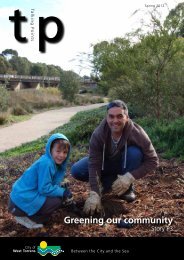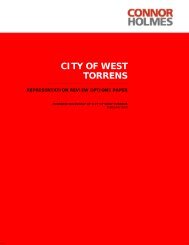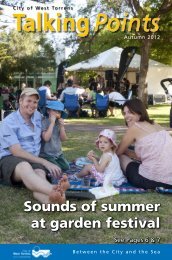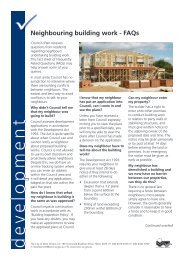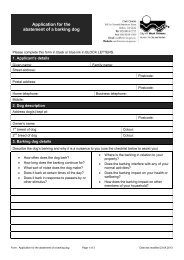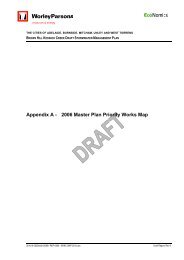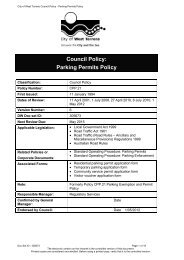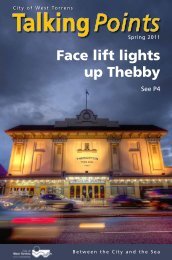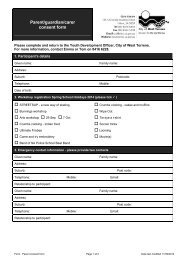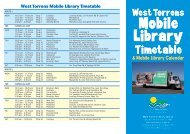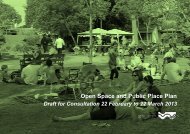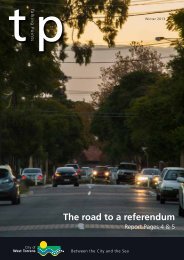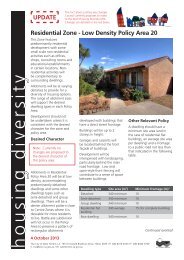Recommendations - City of West Torrens - SA.Gov.au
Recommendations - City of West Torrens - SA.Gov.au
Recommendations - City of West Torrens - SA.Gov.au
You also want an ePaper? Increase the reach of your titles
YUMPU automatically turns print PDFs into web optimized ePapers that Google loves.
Travel Demand Management (TDM) is<br />
aimed at modifying travel behaviour to<br />
reduce or redistribute travel demand.<br />
TDM aims to improve the utilisation<br />
<strong>of</strong> existing resources by encouraging<br />
more efficient use <strong>of</strong> existing transport<br />
infrastructure and services. One<br />
<strong>of</strong> the most significant aspects <strong>of</strong><br />
travel behaviour to be targeted in<br />
TDM strategies is the continuing<br />
dependence on private vehicles for<br />
personal travel and the associated<br />
low average vehicle occupancies,<br />
particularly during peak times.<br />
TDM initiatives include reducing singleoccupant<br />
car use and encouraging<br />
more sustainable transport choices to<br />
meet personal travel needs.<br />
Transport 2007 An Action Plan for<br />
South East Queensland identifies that<br />
TDM initiatives can be categorised into<br />
two broad categories:<br />
S<strong>of</strong>t measures:<br />
• education and awareness campaigns<br />
• workplace travel plans<br />
• teleworking opportunities<br />
• flexible working hours to facilitate<br />
peak spreading<br />
• car pooling<br />
• destination travel plans (non<br />
workplace travel)<br />
• school programs<br />
• household travel (eg travel blending)<br />
• Intelligent Transport Systems.<br />
In recent years there has been a rapid<br />
expansion in the development and<br />
application <strong>of</strong> technology to transport.<br />
Intelligent Transport Systems (ITS)<br />
can reduce travel demands and make<br />
more efficient use <strong>of</strong> existing system<br />
52<br />
Part 1 - Overview | Travel Demand Management<br />
capacity. ITS provide people with better<br />
travel information to enable them<br />
to make informed decisions on their<br />
travel behaviour and patterns.<br />
ITS includes:<br />
• providing real-time information for<br />
travellers<br />
• improving traffic management systems<br />
• using advanced in-vehicle<br />
technologies<br />
• improving systems to detect and<br />
respond to emergencies and major<br />
traffic incidents.<br />
Hard measures:<br />
• parking supply measures (restrict or<br />
control supply)<br />
• parking pricing.<br />
Many <strong>of</strong> the above initiatives are also<br />
identified for South Australia.<br />
‘ TravelSmart aims to achieve<br />
change in personal travel<br />
behaviour, from single-car<br />
occupant to sustainable<br />
modes <strong>of</strong> travel (public<br />
transport, walking and<br />
cycling), smarter car use<br />
(car pooling) and in some<br />
cases travel substitution<br />
(teleworking).’<br />
TravelSmart<br />
The TravelSmart program helps people<br />
to explore and assess their transport<br />
options. The program aims to achieve<br />
a sustainable change in personal travel<br />
behaviour from single-car occupant<br />
to sustainable modes <strong>of</strong> travel (public<br />
transport, walking and cycling), smarter<br />
car use (car pooling) and in some cases,<br />
travel substitution (teleworking).<br />
TravelSmart employs intensive,<br />
customised marketing campaigns<br />
conducted within local communities,<br />
schools, universities and workplaces,<br />
to ensure that people who might<br />
be swayed by the benefits <strong>of</strong> using<br />
alternative modes have full information<br />
about the choices available to them.<br />
DTEI has a TravelSmart Coordinator<br />
who provides advice and assistance to<br />
organisations wishing to participate in<br />
TravelSmart programs, some <strong>of</strong> which<br />
are briefly described below.<br />
Walking School Bus Program<br />
A 12-month trial for 10 schools in<br />
South Australia has recently been<br />
completed.<br />
The TravelSmart Coordinator <strong>of</strong><br />
DTEI works with schools and<br />
parents to establish Walking Bus<br />
Programs, including providing<br />
advice on registration, publicity and<br />
volunteer training (parents). As part<br />
<strong>of</strong> identifying appropriate routes <strong>of</strong><br />
travel, DTEI and Council would be<br />
involved in carrying an <strong>au</strong>dit <strong>of</strong> these<br />
routes and implement improvements<br />
along the routes such as trimming<br />
overhanging vegetation, installing<br />
pedestrian ramps and providing<br />
crossing facilities over busy roads.<br />
DTEI has advised that it would provide<br />
insurance cover for the volunteers <strong>of</strong><br />
the program.<br />
Council is currently seeking expressions<br />
<strong>of</strong> interest from local schools to carry<br />
out a Walking School Bus program in<br />
the <strong>City</strong>.



